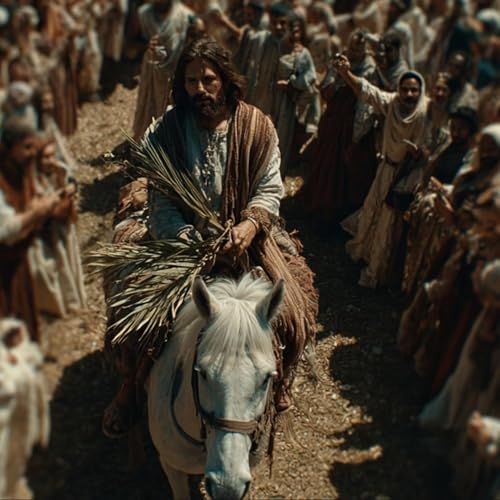
Ep. 140: The Triumphal Entry
No se pudo agregar al carrito
Add to Cart failed.
Error al Agregar a Lista de Deseos.
Error al eliminar de la lista de deseos.
Error al añadir a tu biblioteca
Error al seguir el podcast
Error al dejar de seguir el podcast
-
Narrado por:
-
De:
The Triumphal Entrance: Power, Servanthood, and the Scandal of Grace | Ep 140 - Focused on Christ
Join hosts Mike Crump and Pastor Nathan Smith as they dive into The Triumphal Entry of Jesus into Jerusalem, a significant event traditionally associated with Passion Week.In this episode, they explore the dramatic context and contrast of this moment by first looking at the request of the mother of the sons of Zebedee in Matthew 20. The hosts discuss her self-seeking petition for her sons to sit at Jesus' right and left hand in his kingdom, which they likely understood as a political messiahship intended to overthrow Rome and restore the Davidic age.They break down Jesus' challenging response about drinking his cup, which the disciples initially understood as relational fellowship. Pastor Smith notes that this fellowship would later be understood to include sharing in Christ's suffering.The conversation then focuses on Jesus' teaching on true greatness:Serving others: Jesus contrasts the worldly rulers who "lord it over them" with the new standard for his followers—that the greatest must be a servant and the first must be a slave.The gold standard: Jesus sets himself up as the example, having "come not to be served, but to serve and to give his life as a ransom for many".Humility is the path of godliness.The Triumphal Entry: Peace and ProphecyThe hosts then transition to the Triumphal Entry in Matthew 21, discussing the significance of the event and its symbolism.The Donkey: The act of Jesus riding on a donkey (or colt) symbolizes peace, contrasting with a horse, which was an instrument of war.Prophetic Image: Laying down cloaks and branches was a sign of great respect, an act traditionally reserved for a king. The movement of Jesus from the Mount of Olives down through the eastern gate and into the temple is seen as a foreshadowing of the glory of God returning to Jerusalem, as prophesied in Ezekiel.The Proclamation: The crowds shouted "Hosanna to the Son of David," proclaiming him to be the prophesied Messiah (though likely understood as a political figure, not God himself) and the prophet spoken of by Deuteronomy.Finally, they tackle the irony of the crowd's quick turn against Jesus during the crucifixion, noting that many were likely disappointed when he didn't bring the expected political revolution.The episode concludes by reconciling the dual nature of Christ—the glorious God deserving of all praise and the one who came to be a servant and die for sinners. This incredible contrast is termed the "scandal of grace," which should move believers to a joyful desire to serve others.


